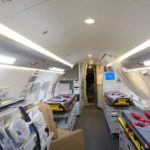Dame Deidre Hutton, Chair of the UK Civil Aviation Authority issued a stark warning to those ignoring the need to increase diversity in the hiring process on the final day of FIA Connect.
Just like the real word version of the event, the final day focused on the opportunities within the aerospace, aviation, space and defence for the next generation. Despite the challenges posed by COVID-19, speakers believed that a commitment to diversity and inclusion would not only help the industries recover from the freefall in demand caused by the pandemic, it would bring fresh ideas which would be key to the growth of aviation in the future.
UK has lowest number of UK engineers in Europe
Hutton said statistics showed that the UK still had a long way to achieve a more diverse workforce: “One statistic I have is that In the UK, we have the lowest number of women in engineering professionals as a career of anywhere in Europe at 11 per cent – you know that is really, pretty awful. And if aviation grows as, I actually believe it will, in all these challenges, then industry is going to need women, there aren’t going to be enough blokes to do the jobs. So it’s really important. But also diversity, just bringing such an interesting range of ideas, it makes people creative. It Just brings in a whole range of different things. So, what are you got to do to get girls?”
Language used in job roles can make the difference for a balanced response
Kirsty Murphy, pilot of Blade 2 in the The Blades Aerobatic Team and the first female pilot for the Red Arrows, said the language used in job applications could make all the difference for attracting female applicants. She outlined a situation where a job advert had attracted just 8 per cent of female applicants for an engineering role but simply changing the wording of a reissued advert yielded a more balanced response.
“So they’ve not changed the job, they’ve not changed the roles and responsibilities, they’ve changed how the job is described. Some of the competitive wording was removed and so words like ‘challenge’ or ‘competition’ are taken out and other words put in their place, along the lines of ‘being able to make a difference’ or ‘work as part of the team’. So, like I say not changing the job, just changing how it is described. And when they put it back out 48 per cent of people who applied for it were female.”
Use your interests in space
Kathie Bowden who works Skills and Careers Development at the UK Space Agency, said space was the final frontier for diversity of opportunity and interests. She said: “It’s also about climate data. It’s also about Earth observation data that gives us information about the planet, about agriculture about about geology it can go absolutely anywhere. And one of the things I always say about space is ‘What’s your passion?’ What do you really like doing. And we can probably find a space, a place that you can use your interests within space.”
But she also said there was a need for employers to “step up.” It was a frequent comment that employers didn’t see enough work experience on CVs but there was a disconnect between these demands and the opportunities available for young people.
The agency is attempting to fill this gap, having established SPIN, a programme which brokers opportunities for students during their university studies to be able to access all kinds of different work experience seven years ago.
Subscribe to the FINN weekly newsletter

